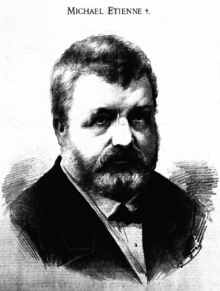Michael Etienne
Michael Etienne (also Michael Ettinger ; born September 21, 1827 in Vienna , † April 29, 1879 in Vienna) was an Austrian journalist and publicist.
Life
Michael Etienne was born in the house of Laimgrube number 2 "zum golden Metzen" on the grain market . His father Claude Etienne, professor of the French language at the Imperial and Royal Engineering Academy, and his mother Therese, née Hugelmann, gave him the most careful upbringing. He graduated from the Schottengymnasium and continued his studies at the university. In 1843 he was first active in literature. He translated the novels of Dumas , Sue and George Sand for the publishing house bookstore von Hartleben and delivered an impressive series of volumes by 1850. Etienne published poems in fiction journals. March 13, 1848, also loosed the tongue of the young man, who was ardent with freedom, politically. On March 14th he greeted the new era with a poem full of enthusiasm. A month later he published two brochures: "Austria and Europe" and "Von der Presse", where he vehemently advocated freedom of the press. His editorial series entitled The May Days and published in Wanderer in July 1949 brought the young author to court before the press court . He had drawn the articles with Miguel , but he took full responsibility and led his defense without legal assistance. He was sentenced to three weeks' arrest - the public prosecutor Dr. v. Wiedenfeld had applied for three months - but released from paying the court costs. Etienne waived his right of appeal when the state of siege was imposed on Vienna and was sentenced to prison in July 1849.
When he had served his imprisonment, he was active in foreign papers, mainly in Keil's lighthouse . The police monitored this activity and Etienne soon had to flee. He made his way to Paris via Leipzig and Berlin . There he found the friendliest reception at the Agence Havas . In 1851 he entered into close relationships with Heinrich Heine . In Paris Etienne made the most in-depth studies in the fields of constitutional law, history, economics and literature, and the fine arts. His position in Paris was by no means a pleasant one. He joined the coup policy and the corruption system of Napoleon III. opposite. On February 5, 1852, he received a warning from the Police Prefect Pietri because of his foreign correspondence. A year later, at the same time, he was dragged to Mazas at the same time as Moritz Hartmann for alleged participation in secret societies and sentenced.
His detention ended on February 22nd. As a result, Etienne wrote correspondence for the Donau-Zeitung in Vienna, which caused quite a stir there. In 1855 he accepted an invitation from Schwarz, the owner of this journal, moved to Vienna and joined the editorial team of the Donau-Zeitung. After a few months he switched to the editorial office of the press through the mediation of his friend Karl Eduard Bauernschmid . For eight years, from 1856 to 1864, Etienne was active in the "press" and helped it to become increasingly influential. Etienne won Dr. Max Friedländer , whose skills complemented his. In March 1864 both founded the Neue Freie Presse together with Adolf Werthner .
Michael Etienne died on April 29, 1879 after "long suffering", his mausoleum at the Hadersdorf-Weidlingau cemetery was designed by the architect Otto Hieser . Etienne's successor as editor of the " Neue Freie Presse " was Eduard Bacher .
literature
- † Michael Etienne. In: Neue Freie Presse , Abendblatt, April 29, 1879, p. 1 (online at ANNO ).
- Etienne, Michael. In: Austrian Biographical Lexicon 1815–1950 (ÖBL). Volume 1, Verlag der Österreichischen Akademie der Wissenschaften, Vienna 1957, p. 271.
Web links
Individual evidence
- ^ The New Free Press - From the World Journal of the Danube Monarchy to the annexation of Austria to the German Empire.
| personal data | |
|---|---|
| SURNAME | Etienne, Michael |
| ALTERNATIVE NAMES | Ettinger, Michael |
| BRIEF DESCRIPTION | Austrian journalist and publicist |
| DATE OF BIRTH | September 21, 1827 |
| PLACE OF BIRTH | Vienna |
| DATE OF DEATH | April 29, 1879 |
| Place of death | Vienna |
